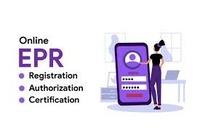In recent years, the issue of plastic waste management has become one of the most pressing environmental concerns. As plastic production continues to rise globally, the need for sustainable practices has never been more urgent. This is where the concept of Extended Producer Responsibility (EPR) comes into play. Specifically, a “Plastic EPR Certificate” is a formal recognition of a producer’s commitment to managing plastic waste generated from their products. This certificate plays a pivotal role in advancing sustainable waste management practices and ensuring that producers are held accountable for the lifecycle of their products, from production to disposal.
What is Plastic EPR?
Plastic EPR is a policy framework that holds producers (manufacturers, importers, and brand owners) responsible for the post-consumer waste management of plastic products they put into the market. Under EPR regulations, producers are required to manage the collection, recycling, and disposal of plastic waste generated by their products. This system ensures that plastic waste does not end up polluting the environment but is instead recycled or disposed of in a sustainable manner.
The concept of EPR was first introduced in the 1990s as a way to reduce waste and encourage producers to take responsibility for the environmental impact of their products. Over time, it has evolved to address various waste streams, including plastics. The introduction of a Plastic EPR Certificate serves as a way to validate a company’s compliance with these regulations and its contribution to sustainable waste management.
Why is the Plastic EPR Certificate Important?
A Plastic EPR Certificate is important for several reasons, particularly as the world grapples with the harmful effects of plastic pollution. Below are some of the key reasons why this certification is critical:
1. Promotes Accountability and Responsibility
One of the core principles of EPR is that the producers of products are responsible for the environmental impacts of those products throughout their lifecycle. A Plastic EPR Certificate ensures that producers take responsibility for the plastic waste generated by their products. This not only encourages businesses to design products with recyclability in mind but also holds them accountable for waste management, which ultimately benefits the environment.
2. Supports Recycling and Waste Management Systems
Plastic waste, when not managed properly, can have devastating consequences on ecosystems, wildlife, and human health. With a Plastic EPR Certificate, companies contribute financially or through physical initiatives to support recycling programs and waste management systems. This helps to reduce the amount of plastic waste sent to landfills and incinerators, which are harmful to the environment. Moreover, EPR schemes often encourage the development of more efficient and advanced recycling technologies.
3. Encourages Circular Economy Practices
The Circular Economy is an economic model that focuses on reducing waste and reusing resources. A Plastic EPR Certificate helps promote this model by encouraging businesses to recycle and reuse plastic materials. Instead of producing new plastic from virgin materials, businesses are incentivized to use recycled plastic, which reduces energy consumption, lowers carbon emissions, and minimizes the exploitation of natural resources.
4. Enhances Corporate Social Responsibility (CSR)
For businesses, obtaining a Plastic EPR Certificate demonstrates a commitment to environmental stewardship and social responsibility. This is an essential aspect of modern corporate branding, as consumers are becoming more conscious of the environmental impact of their purchases. A Plastic EPR Certificate acts as proof that a company is meeting its environmental obligations, which can enhance brand image, attract eco-conscious customers, and foster goodwill with regulators and stakeholders.
5. Compliance with National and International Regulations
In many countries, plastic waste management is becoming increasingly regulated. Governments are adopting stricter EPR laws, and producers are required to comply with these regulations to avoid fines or other legal repercussions. Obtaining a Plastic EPR Certificate ensures that a company is in compliance with local, national, and international EPR laws. This also enables businesses to stay ahead of the regulatory curve and be prepared for future policy developments related to waste management.
6. Collaboration with Stakeholders
A Plastic EPR Certificate can also promote collaboration between various stakeholders involved in waste management. These include local governments, recycling companies, waste collection agencies, and environmental NGOs. By working together, these stakeholders can develop and implement more effective waste management systems, ensuring that the producer’s plastic products are properly recycled or disposed of.
The Process of Obtaining a Plastic EPR Certificate
The process of obtaining a Plastic EPR Certificate can vary depending on the specific requirements of a country or region. However, there are several general steps that producers typically need to follow:
1. Registration with EPR Authorities
Producers must first register with the relevant EPR authorities in their jurisdiction. This involves submitting key information about the company’s business operations, including the types and quantities of plastic products they produce or import into the market.
2. Establishing Compliance Plans
Once registered, companies must submit a compliance plan to demonstrate how they will fulfill their EPR obligations. This plan typically includes details about how the company will manage the collection, recycling, and disposal of the plastic waste generated by their products. It may also outline strategies for reducing plastic waste, such as through the use of recyclable or biodegradable materials.
3. Financial Contributions
In many jurisdictions, producers are required to contribute financially to support waste management and recycling initiatives. This may include paying a fee to cover the costs of collection, sorting, and recycling of their plastic products. These contributions help fund the infrastructure necessary for efficient waste management.
4. Audits and Inspections
In order to verify that the company is fulfilling its EPR obligations, periodic audits and inspections are often required. These audits assess whether the company is properly managing its plastic waste and adhering to the guidelines set out in its compliance plan. If a company fails an audit, it may face penalties or be required to take corrective action.
5. Issuance of the Plastic EPR Certificate
Once the company has successfully met all the requirements and has complied with the relevant regulations, they are issued the Plastic EPR Certificate. This certificate serves as formal recognition of their efforts to manage plastic waste responsibly.
Challenges and Opportunities
While the Plastic EPR Certificate presents significant environmental benefits, there are also challenges to its implementation. One of the key challenges is the lack of standardization in EPR systems across different regions, which can create confusion for businesses operating in multiple countries. Additionally, the costs associated with compliance may be prohibitive for small and medium-sized enterprises (SMEs).
However, the growing global focus on sustainability presents opportunities for companies to innovate and adopt more sustainable business practices. As consumers demand greater environmental responsibility from brands, businesses that embrace EPR schemes may gain a competitive advantage in the market. Moreover, advancements in recycling technologies and the development of more efficient waste management systems could further enhance the effectiveness of EPR schemes.
Conclusion
The Plastic EPR Certificate plays a vital role in the ongoing battle against plastic pollution. By promoting responsibility among producers, supporting recycling efforts, and encouraging circular economy practices, it contributes to a more sustainable future. As more companies embrace EPR principles, the world can move closer to reducing plastic waste and mitigating its harmful effects on the environment. As the global community continues to prioritize sustainability, the Plastic EPR Certificate will likely become an essential tool in fostering a more eco-conscious and waste-free world.

